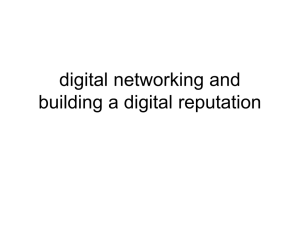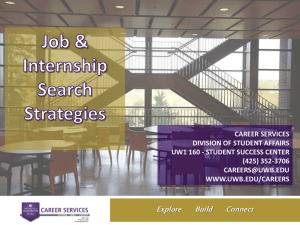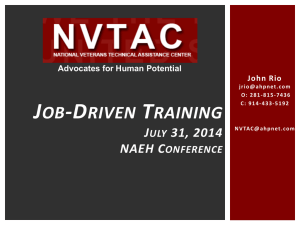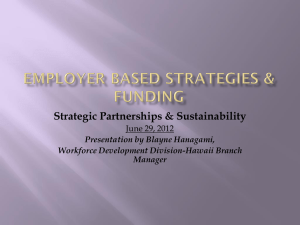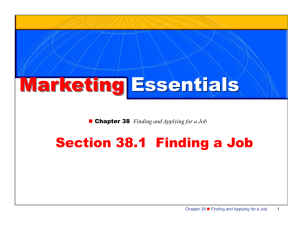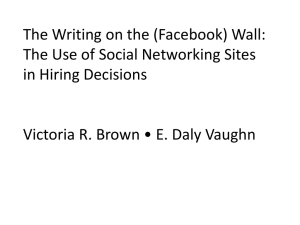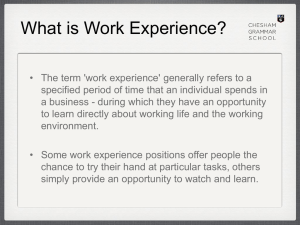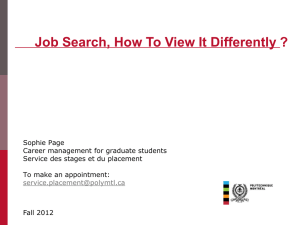handouts from this presentation
advertisement
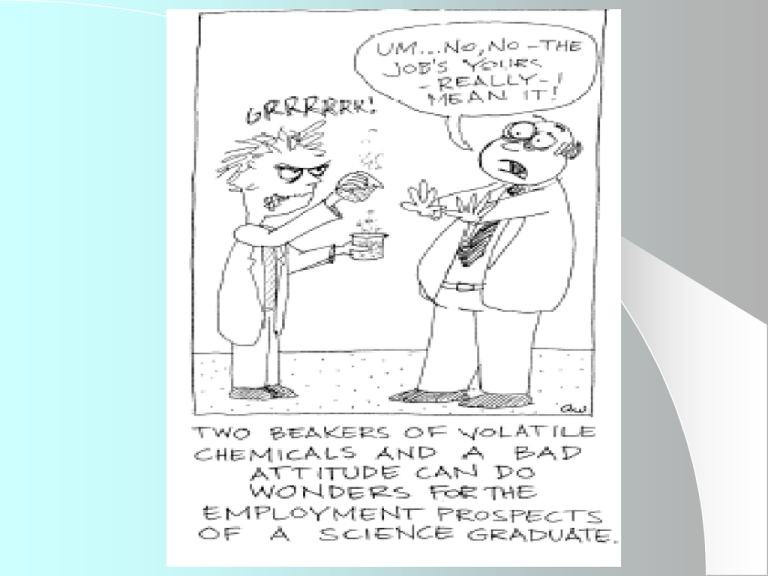
Linda Moore Director EIU Career Services Job Search Skills Assumptions about your preparation for this workshop #1. You have a one or more targeted resumes & cover letters. If not, work with a career counselor at EIU. #2. You have a couple of job paths that you are focused on. If not, seek out a career counselor #3. You know how to do company research. If not look at our website and get training materials from our office. #4. You have practiced interviewing, have an elevator pitch and appropriate interview attire. If not, see our website or a counselor. Job Search Plan Resources for your job search a. Determine which resources you will use b. Use a mix of resources (face to face, online, 1st level, 2nd level, etc) c. Prioritize which resources will receive a certain amount of time because some resources will likely produce more results than others. Time & Structure of your job search a. Full time job search if you are unemployed b. College students should treat this like a class (5 hrs/week min.) c. Schedule your job search time – day and time, where Resources for you Job Search People #1 Way to get a job/Networking - especially true for experienced job seekers Employers & Professional Societies - employer websites are commonly used by candidates & there you have the most competition. About 30% employer hires are from their websites. - professional societies list jobs. Less competitive because those are less visible to the public. Great source and good impression of your brand. Panther Recruiting - where you find many jobs featuring degree but not requiring much experience. Commercial Online Sites/Headhunters – major online job boards sell data and have limited quality control. Some good leads & should be used as a limited part of your job search plan instead of the major source Networking in the Real World: • Look for PEOPLE, not JOBS “Networking is making links from people we know to people they know, in an organized way, for a specific purpose, while remaining committed to doing our part, expecting nothing in return.” Donna Fisher and Sandy Vilas, Power Networking Why Network? Some Stats: A referral generates 80% more results than a cold call. Job search smart! 75% of people get their jobs through networking. (a.k.a. always leave a good impression) Up to 80% of jobs are not advertised! Networking Involves: Establishing goals. What is your networking mission? a. Learn about jobs from those working in the field b. Make connections for jobs or internships c. Enhance your professional knowledge through shared info Analyzing the kinds of help you will need in achieving your goals. a. Type of help depends on your mission b. Experts, versus mentors, versus those who are connected Analyzing & developing your people skills. a. Be a clear communicator, polished, engaging, grateful and giving. Building and cultivating your network accordingly. a. Start early. Pace to your need. Don’t wait until you need something. 4 Layers of Separation You Level 1 Contact Your Friend Alice Level 2 Contact Alice’s Uncle Bill Level 3 Contact Bill’s Friend Carol Level 4 Contact Carol’s Boss David Level 1 Contacts Neighbors Classmates/former classmates Other job candidates Relatives Teammates People you socialize with Sorority, Fraternity & Student organizations Former Employers & coworkers Members of your religious congregation People who provide services to you Friends of parents and relatives Professional Associations People dependant upon networking (i.e. realtors, insurance agents, etc.) Networking Log – document quickly after each contact Use Outlook contact or similar contact database KEEP: Contact name, Address, Phone & E-Mail address Occupation & Employer How you met contact Outstanding points about the contact Personal details, family , characteristics & interests Date of each contact Conversation summary Names of 3 referrals, if the contact is for job searching Dates of follow-up on these 3 referrals Date of thank-you note for referrals Other (the contacts needs as you must give back more than you take from each contact). Week 1 Goal: Add 5-10 People to Network Faculty – those who like your class performance LinkedIn Alumni, LinkedIn professional discussion groups - job info, job lead connections. Moves thousands of people from 4th level contact to 2nd level contacts quickly. Professionals at conventions & professional society meetings – face to face networks; they are in the loop and can be looking for new talent at meetings/conventions People you meet casually – vacation, planes, dinner/bar - face to face networks Employers & Professional Societies Target Employers about whom you are passionate at these meetings but don’t dominate them. Meet & greet. Follow up. Find out who is speaking at sessions & attend those presented by employees of your target employers. Follow Target Employers on FB, Twitter and LinkedIn. Post to FB,Twitter, L/in employer fan pages and join LinkedIn discussion groups that their staff are members of Conduct informational interviews but NEVER ask for job or internship unless they bring it up. If you are impressive, the employer may offer! Employers & Professional Societies Resource Tactics in your job search Make Google Alert the employer’s job titles that you like – http://www.google.com/alert Join the related Professional Societies now as a student member (usually cheaper) and maintain society memberships as adults Check professional society job page biweekly Advantages of Panther Recruiting Thousands of employers coded for specific majors. Find out who recruits for your field! Internships (> 1,200 verified internships currently available). College level & experienced candidate jobs – nationally! Often contains recruiter contact name, email and phone number which is normally difficult information to obtain. Passive and active job search capability. You can publicize your resume or not. Secure identity & no selling your data. Employers are screened to eliminate scam jobs and recruiting companies who are just looking for clients. Cost: $30.00 for undergrads – once & lasts for year after graduate. http://www.eiu.edu/~careers Commercial Online Sources for your job search LinkedIN. Jobs (in every discussion group). Facebook employer pages & FB job apps. Great resources & limited competition. Job aggregation services – Indeed.com, SimplyHired.com, The Ladders.com. Ease of use. Can be outdated. Good initial ideas about job titles and employers who hire those jobs. Job search/resume posting – Careerbuilder, Monster, Hot Jobs, Dice, about 10,000 job boards on the net. Many low quality listings on big job boards. Better opportunities on specialized job boards like constructionjobs.com, Dice.com. They make money by selling your data, charging employers for job listings, and posting product ads. The Right Attitude for job searching Positive – about yourself, your skills, your search, past employers, the future and what you can add to the job Persistent – apply for other jobs at the company, keep watching for openings, keep trying to improve while searching Confident – believe that you will be successful in adding value in a new position. Body posture = confident Prepared – company research more than anyone else; know yourself Resourceful – show networks & connections; use of latest technology H.E.L.P. With Your Job Search EIU CAREER SERVICES – we have contacts, ideas, ways to keep you motivated, ability to identify areas for improvement EIU ALUMNI AND CURRENT STUDENTS are always welcome! EMAIL or PHONE APPOINTMENTS AVAILABLE M-F, 8 AM – 4:30 PM, ALTERNATE TIMES AVAILABLE. Call 217-581-2412
